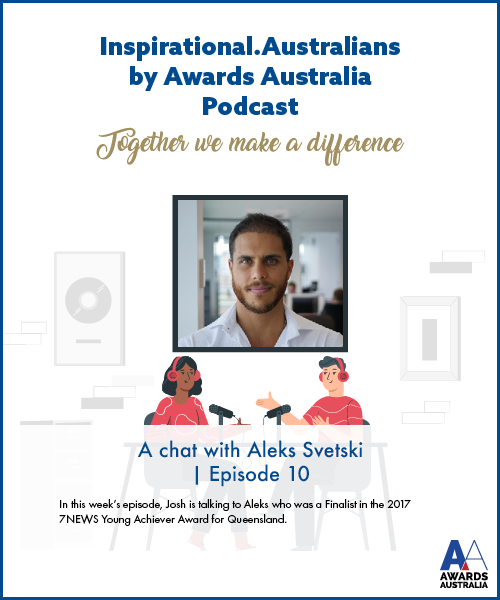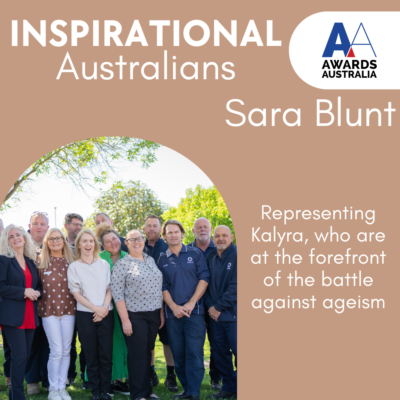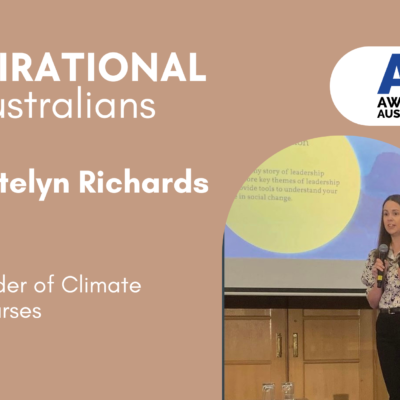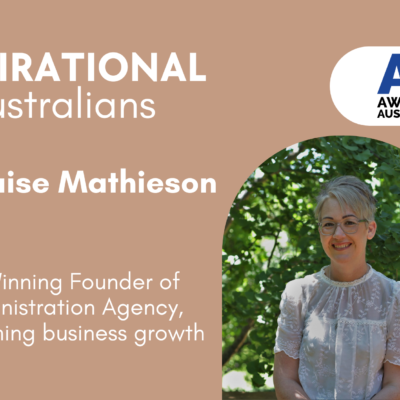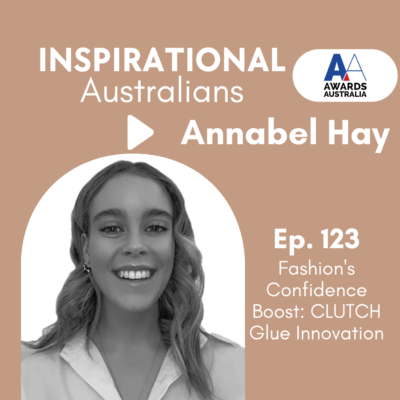In this week’s episode, Josh is talking to Alex who was a Finalist in the 2017 7NEWS Young Achiever Awards for Queensland.
An advocate of personal sovereignty, property rights and sound money, he’s been an avid writer since a younger age, and in 2016 wrote his first public blog post on Medium.
Since then he’s built up an online following, become a top 10 Bitcoin writer on Hacker Noon, and launched one of the world’s most respected Bitcoin Publications; «The Bitcoin Times».
He’s also the founder & CEO @ Amber – Australia’s #1 Bitcoin investment App.
In this episode:
- Hear how Alex went from self-made wealth to $250,000 in debt and his road back out
- Want to know more about Bitcoin? Alex is your man!
- Hear more about the Amber App. If you want the App, see the link below
Links
Connect with Aleks on LinkedIn
Get the Amber App
Some suggested links from Aleks
https://medium.com/hackernoon/why-bitcoin-matters-c8bf733b9fad
https://medium.com/hackernoon/bezos-bitcoin-1baa8383518d
Follow us on our Inspirational.Australians Instagram Page
Want to nominate someone? (It can take as little as 2 minutes to recognise someone making a difference)
Like some more information on Corporate Partnership?
Transcript
Annette:
Welcome to the inspirational Australians podcast, where we chat to people, making a difference in their communities and in the lives of others. And here is your host for today, Josh Griffin
Josh:
So today’s podcast guest, we’ve got Aleks Svetski joining us from London and I got to thank Alex for waking up nice and early to speak with us. Alex is an advocate of personal sovereignty, property rights and sound money. He has been an avid writer since a young age and in 2016 wrote his first public blog posts for Medium. Since then, he’s built up an online following, become a top 10 Bitcoin writer on hacker noon and launch one of the world’s most respected Bitcoin publications – The Bitcoin times. He’s also the founder and CEO at Amber which is Australia’s number one Bitcoin investment app. So Alex, thanks for joining us this morning.
Aleks:
Thank you. That was a, quite a, quite an intro. Really appreciate it.
Josh:
it’s all the stuff that you’ve done. It’s pretty incredible that, um, you know, you’re in London now and writing for these big publications and it’s a topic that a lot of people probably, you know, myself included don’t really have a proper understanding of. Can I ask you a really simple question? Just how did you first get started being involved with Bitcoin?
Aleks:
Uh, it was so I was, um, messing around with gold and silver in 2011, 2012, sort of period. That was after the, obviously the GFC I’d had. I’d had a really interesting experience during that time. So like I had this whole dream to be a millionaire by the time I was 20, um, when, when I was 18 and I was on my own as well on my way there, I took my scholarship money from university. Uh, it was about $5,000 worth and I turned it into about 60 grand in about six months, thought I was a genius. And, uh, a couple of weeks before my birthday in 2007, uh, I experienced, you know, part of like the first tremors of the GFC. And, um, and I was on track. Like if my trades went my way, it would have been worth about a quarter of a mil, uh, on my 20th birthday. And I thought, yeah, I’m not there, but close. And, um, and anyway, a week, a week or so before my birthday, I lost everything. And um, and then I managed over the next yes, over the next six months, I managed to dig myself into about a quarter of a million dollars in debt, $250,000 in minus, which was an interesting experience. So, so that kind of fueled me then that that was what ticked off my entrepreneurial journey, but it also kicked off my journey into trying to understand markets and economics. And what, why do, why, how in the name of Christ did everything blow up so badly? And as I started learning about that, I started discovering, you know, how, uh, you know, uh, the actual money, uh, which, you know, money, its very definition is kind of like a measure of human beings, time and effort as they input in society and money should map directly to time and effort. And, and for, for time in memorial, like we’ve used different, um, objects represent money, but for a long time we used gold and gold just has some really interesting attributes. And what I found was that, you know, in 1971, you know, the world came off the gold standard and you know, governments around the world started just printing money. And as, as you print money, like if you can, like, you can’t create time and energy, but if you can print money, you kind of start to distort how society functions because you and I have to work for money. Like we have to trade our time and energy. Somebody else can just press a button and create it out of thin air. So, so you start to create these really disastrous consequences. And as I started reading that, I started realizing that, you know, that there’s something else going on here and then not from a conspiratorial standpoint, but more so from a sound economic standpoint, it’s like, you know, you don’t get something for nothing in the world.
And when we, as a society gone and try and create mechanisms to create something for nothing, you know, we start to get these, um, events that happen like 2008, like 2000, like 1992, like 1987. And it’s a recurring thing. Like the problem is, you know, every 10 years or so, like we forget about it. We do the same thing over and over again. Exactly. And here we are again. So basically the long, the long answer to your story is those are the long story answer to your question. Is I always, I was buying gold and silver in 2011 because I was like, man, these guys have just injected a trillion dollars into the system out of thin air and golden silver went ballistic. Like, um, you know, that’s actually one of the ways I dug myself out of the hole that I was in, um, was, you know, gold went from something like $800, 2000 silver went from, I think it was nine or $10 up to $50.
So, so, and that’s where I first heard about Bitcoin, but to my everlasting regret, I dismissed it at the time. I was like, what’s this internet funny money? You know, no one really cares whatever. And I stuck with my gold and silver and look, I did well, you know, I sold out at the top. Um, and then I sort of moved on to other ventures and things like that. But I came back around, like I had a catalyst in my life where I’d built a tech company and then I had a disagreement with the board and um, and I got what I call Steve jobbed out of my own company. So, you know, and yeah, that was in 2016. And at that time I was a little bit distraught. I was like, Oh, what am I going to do next? And I was looking at all these sorts of a three D printing and this and that.
And Bitcoin sort of came across my radar again. I was like, what the hell? This thing is still around. And when I’d first heard about it, it was, you know, somewhere around like 10 or $15. And this time it was $600. Nothing, what the hell have I missed here? And then I started digging and I found like all of these similarities to like Bitcoin, why it exists, you know, the, the fact that it’s fixed in supply that it’s, you can’t print it. You can’t confiscate it and you can’t manipulate it. And you can’t like all these sorts of things, which have a lot of similarities to gold physical properties. And all of a sudden, like I fell down the proverbial rabbit hole and I’m, and here I am four and a bit years later a waving flag. So there’s the, there’s a medium length story,
Josh:
The medium light there. All right. We missed out, well, I was going to say there’s about a million things I could have interjected there and then try and dig deeper in this interesting stuff that’s happened to you, Alex. So, um, you know, in terms of Bitcoin, like, can you give, you know, for our listeners who, you know, maybe they know Bitcoin, they’ve heard about it, but don’t really know much else can give us like the three Bitcoin for dummies little like top three backs or something that people might just help them wrap their head around it a bit more. So yeah, one thing we touched on it, there was fixed supply.
Aleks:
Yup. Yup. So that’s probably one of the biggest elements of econ is this, this idea that you’ve got a digital object that is fixed scarce and cannot be duplicated. So, um, a lot of like the way we know digital stuff is like, if I send you an email, we’ve created a copy, um, and I can send a million emails and I’ll just create a million copies. So, so digital stuff is not rare. It’s not scarce. And that’s why, um, you know, there’s no effective costs to it. Bitcoin was the first time where a program, uh, was created that now runs on hundreds of thousands of machines around the world. It just it’s the same program running on all of them. Um, an and that program is effectively just recorded the ledger and it has a bunch of rules and the way it effectively works is anybody who chooses to be a part of the Bitcoin network, whether as a user, whether as a minor, whether as a validate or whatever, whatever capacity you’re functioning in is you’re effectively saying that I agree to these rules and you know, one of those rules is there’s 21 million coins, that’s the fixed supply.
And another one is, you know, the, the block chain, which is what the data infrastructure of Bitcoin looks like. So it’s this, uh, blocks of transactions every 10 minutes and there’s economic reason why it happens like that. Um, so, so there’s, there’s all these bits of elements, but basically it enforces this primary rule, which a lot of people know and understand is that there’s a fixed cap. Now that’s really, really, really important because what I said earlier that money represents, um, our time and energy. Now that that’s there too things like, can you go tomorrow? And can you print some more time?
Yeah. Can you, can you create any energy? No. Right. So, so they’re the two fixed constants and effectively the game we play as human beings and society is we do things. We do stuff. Uh, we basically take our time and energy. We mix it with something and we add input into society. So money is supposed to just be this measuring tool to sort of evaluate or measure how much the, how much input were placing into society. Now, someone like Jeff Bezos, for example, who creates an incredible company like Amazon, the input or the impact he has in society is extraordinary because it’s, you know, fundamentally transformed the way it shopping works. So that’s a lot of value. And as a result, he is worth a lot of money because he has fundamentally saved or added that much value to society. Now that gets measured in his example, in US dollars.
For example, now where things get weird is when people start to print money, which is what governance and all that sort of stuff doing. And this is kind of where a lot of people understand gold and understand things like art or even real estate. Another really good example. You know, there’s a, there’s a great saying by, I can’t remember who it was now. I think it was Emerson or someone like that or said “buy land sun, they ain’t printing anymore of that.” And, um, and, and the idea is that you, you, you buy something that, you know, can’t be just created out of thin air. And Bitcoin’s the first and last because digital scarcity by definition is a one time event. The first and last time a organic computer program that runs completely like without centralized control has emerged from the internet. Um, it was, uh, it was put online by a, um, this is maybe fact number two is, um, by anonymous creator. Nobody knows who it is, what it was when there was a group, whether it was a man woman, nobody knows like placed with some rules and it was adopted by the community organically, not by somebody saying what this is. It was just, this is what it was. And it’s opensource software. Anybody can run Bitcoin, all that sort of stuff. So you’ve got this thing that is fixed in supply. We achieved the ultimate invention, which is digital scarcity. And because what Bitcoin is, is it’s a monetary network with a monetary unit. So it’s got Bitcoin the currency on Bitcoin, the network, we now have a money that sits outside of a government control, central bank control, banking control. It literally enables anybody, whether it’s you, me, you know, an Intuit in the Arctic, you know, someone like it doesn’t matter who or what you are. You can now participate in a globally connected, uh, financial system, which has never existed before in the history of humanity.
Like, um, and so, so if I was to sum up the three things fixed supply, so it’s like the first time we’ve had fixed supply money, like gold came close because gold is, I mean, fundamentally fixed supplying the earth. Like you can’t just print more of it. And it’s always been the alchemists stream, but they’ve always failed. So the fixed supply is really important. Number two anonymous creator. So there’s no way to shut this thing down. You can’t knock on someone’s door and say, turn it off. Like the only way to shut that one down with beta nuke, the entire internet. Um, and number three it’s um, I don’t know, what can I say for number three? It’s like a, it’s a, it’s not run by anyone. It’s, it’s a network that lives and breathes based on, uh, the people that are involved in it, whether as a user, whether it’s a minor, whether as a validate or whether as an exchange and in all these capacities. So it, doesn’t, it’s really like natural, organic and emergent and, um, and that’s super, super, super unique. We’ve never seen anything like that before in, in, I mean the internet might come close, but I would argue that Bitcoin’s actually a bigger deal than the internet even was. So yeah,
Josh:
There you go. Thanks for that, Aleks. That’s awesome. Just gives people, you know, myself included a bit more of an understanding and in my head, you know, I’m picturing the Mark Zuckerberg type, who’s the, you know, the figurehead that he created it, but that’s interesting. It’s just a, there’s not that it doesn’t exist.
Aleks:
Yeah. It doesn’t exist. And that’s, what’s so incredible actually, because imagine like people, these days have problem with like, Oh, you know, Mark Zuckerberg on Facebook, you know, being able to dictate what people can say these days, and that’s really dangerous and free economy, right. Or, or, or, or if we want to live in a free society now, imagine if somebody was running the money. Right. So, and, and at the moment somebody does run the money and it’s, you know, it’s government and that’s, that’s a really dangerous position for society to be in because, you know, it’s, it always leads down the path of some level of authoritarianism. And the problem is, as soon as you move into some level of authoritarianism, it starts to then compound itself. Um, and over time, society ends up decaying or, and it may not even be intentional. You know, I’m not here to say that, you know, government’s intentionally trying to steal from their people, but it happens just as a necessity of, of a government trying to stay alive. Right. It’s like they make a mistake and how does the government fix the mistake? Or they tax us, or they print money, which both of them, uh, you know, ways of taking wealth away from people. Right. But it’s, it’s the only option they have. Whereas for the first time you’ve got this thing that sits outside of anybody’s individual control, um, and that therein lies its power. Like, and that’s again, where I draw an analogy to gold is like, um, you know, you can’t like, Gold’s important because it’s got these cool physical properties. It doesn’t react with anything it’s scarce. It’s, you know, it’s fundable, it’s got all these properties. You can’t just go in and copy that with another metal, because it’s another metal it’s gold, or you can try and pass led offers gold, but, you know, you’re the, you’re an idiot.
Like you got scammed. If you bought lead ins and thinking it was gold, right. Because they’re different properties. And that’s the thing with Bitcoin. And whether you talking traditional money, or even every other cryptocurrency, like all the other cryptocurrencies, just basically fake gold and people trying to sell the promise of Bitcoin, um, with the word crypto, um, but not understanding the principles upon which they can exists.
Josh:
Anyway, I like it. I like it. Well, might hit you with a couple of questions that will be some shorter answers. So for example, you know, all this stuff you’re talking about, your journey led to in 2017, you being a finalist in the I Fly Online Achievement Award, which was a category as part of the 7News Young Achiever Awards for Queensland. So what was kind of happening then that led to you becoming a finalist?
Aleks:
So I can’t remember now whether it was 2017, that means I would have been just a kind of figuring out what I’m going to do with Amber, which is the Bitcoin app.
Josh:
Amber was part of that, for sure.
Aleks:
It was okay. Cool. All right. So, so yeah, that’s basically where I’m where I would have been. So I would have, I would have finished up at Irecruit, which is the previous business, um, and kind of like moved on from that, um, learned my lessons about, you know, having a board that’s too big and yada, yada, yada,
Josh:
Looks like a bit of an acrimonious departure.
Aleks:
It was a, it was an interesting one. I must admit, look at the time, like I felt super betrayed and all this sort of stuff, which is, this is part of the trials and tribulations you go through in a business. Right. And, um, but the older I become, the more I realized that I was a bit young and arrogant as well. Um, so, you know, I, I, I wanted my way, the board wanted it their way and we didn’t really come to an amicable sort of conclusion. So, um, so anyway, I left that and yeah. So in 2017, I guess I was mapping out like, cause I’d been running around at least by that stage for almost nine months or close to 12 months running around, telling everyone to buy some Bitcoin. And everyone just looked at me like I’ve got three heads know, trust me, there’s something here trusts me, trust me, trust me. And, um, and I thought, and, and someone said it to me, they’re like, well, all right, Mr. Nodal, you know, you’re so good at business. You think, you know, what’s going on here? Why don’t you build something? And I was like, Hmm, don’t mind if I do that.
Josh:
That resonated obviously.
Aleks:
Yeah. Yeah. And that’s, that’s usually, I think that’s one of the beautiful things about entrepreneurial-ism is that, you know, you can, you can go out and complain about something or you can go and do something about it. And, you know, all, I was basically, you know, for a couple months complaining about, you know, why, why don’t more people buy Bitcoin. And I was like, well, it’s fundamentally hard, you know, it’s, it’s not easy. And that’s where I think, you know, things like what you guys do with your awards is, you know, you reward entrepreneurial spirit and people that are creating things and, um, bringing new knowledge, whether it’s to the market, to consumers, whether it’s, um, defining new categories. Like there’s a, if you’re familiar with Peter Teal, you know, one of the founders of PayPal, first major investment in Facebook, you know, he wrote the book Zero to One and in the book, he basically makes the statement that the next Bill Gates won’t be building a Microsoft. The next Mark Zuckerberg, won’t be building a Facebook like zero to one innovation is a binary difference. Like it it’s, something is created that’s unlike anything we’ve ever had before. And I would say the internet was a zero to one, um, innovation, um, because, you know, we had communication, which was direct before an internet network of nodes that allowed communication to wrap around the world. So that was fundamentally different. Electricity was a zero to one. Um, arguably, you know, Facebook was a zero to one. There was no real, like Myspace was kind of a social network, but not to the same degree as to what my, what Facebook was. Uh, Uber was a zero to one. Um, but I would say the biggest, uh, zero to one since the internet or since the electricity is something like Bitcoin and, and this, this is fundamentally what entrepreneurs do. And it, depending on the scale of the zero to one, obviously it’s like that, that then drives the scale of the impact in the world. And again, this, this is sort of what, um, what being an entrepreneur is about. And, you know, what being involved in organizations like yours is about its people who go and discover something, find some sort of first principle sentiment and develop a way for more people to participate or be a part of it. And that’s what I think is special, not only about entrepreneurs, but about sort of the idea of free society. Yeah.
Josh:
And so with Amber is that, you know, you mentioned free society just there at the end was that kind of, you know, obviously it came from a personal standpoint and you, you said you were building it too to create this, I guess, solve a problem that you were kind of passionate about. Um, and did you say that having an effect with other people out there in the community, like helping them to get involved in?
Aleks:
Yeah, because I think that the more, the more people that, um, I guess this is a, you know, without sounding quaint, but it’s like a power to the people kind of thing that that’s what Bitcoin is all about right? It’s, it’s like in the same way as the Gutenberg, the printing press enabled information to be spread outside of just the church, right. ]That, that, that transforms society, the internet then also allowed us all to become publishers in our own way. Right. Like, you know, before that, you know, who the hell are you and I to go and have our information published to a broader audience? Nobody, we couldn’t do that with the internet, all of a sudden enabled anybody to participate, um, in, uh, communication, in discussion. And, and it sort of connected the world with, you know, we’ve done so much with that. Um, now Bitcoin then unlocks the ability for all of us to, uh, fundamentally participate, uh, in an economic system. Because if you can’t participate in an economic system, like did, this is, is, and it’s really important to define what economic system means. It just means a way for you to share your time and energy and, uh, traded with other people. Simple as that, if you can’t do that, guess what you’re screwed, you know, you can’t, and that’s how people get left behind in society. But when you can participate in an economic system, then, you know, people can, uh, grow, they can interact, they can trade, they can build communities, they can, they can innovate, they can become entrepreneurial, they can do all these sorts of things that we hold important. And my hope is that the, with Amber, the impact that will have on the world is that more and more people will find an easy way to buy and hold some Bitcoin. And as a result, hopefully be one of the catalysts that over the next 10, 20, 30, 40 years helps transition the world off these, um, you know, these stupid government currencies, which I think are ridiculous. It’s, it’s, it’s almost like, um, you know, what’s an analogy that we could use here. It’s like the internet is where we, we can all be free to express ourselves, whereas beforehand we weren’t. And we had to like, um, allow newspapers and particular chosen media to tell us what to think. Whereas at the moment it’s like the governments and central banks are almost like the old media. It’s like, they get to print it, the money they get to choose what happens with the money. And none of us have a say in the matter, whereas Bitcoin kind of ashes in a new age. And, and it’s, it’s really, really, really like, it’s a big stretch of the mind to think that one day we might live in a world where, you know, money is not run by somebody. But, um, I feel like, you know, that’s, that’s the big zero to one change that that may well, that is likely to happen over the next few decades. Um, so this is definitely a long game thing.
Josh:
You’re right. So, I mean, it’s really interesting because straightaway, when you started speaking at the very top of this podcast, I could tell that, well, I don’t want to speak on your behalf, but it seemed like to me, you can tell me if this is correct or not, that the way your mind thinks is, you know, talk about economics and philosophy and almost merge them together in some respects.
Aleks:
Yeah, yeah, yeah. I actually fundamentally believe like most people try and pass economics offers a science, but it’s not, it’s actually a philosophy. Um, because it’s, it’s, you know, you can’t measure. So, so this is one of, I think also the fallacies of modern society is that we think that we can measure and control and predict complex systems. Um, but we fundamentally, can’t like, there’s a whole branch of mathematics now called complexity theory where everything is based on probabilities, basically. Like you can’t, you can’t know that if you push something here, what complex effect it’s going to have out on the other side. And, uh, true economics basically States that, Hey, we don’t know the ramifications of decisions we make. So instead of trying to centralize and manage everything like there was, I mean, if you look at the Indian economy, when they first, um, you know, when the Brits first left that one of the first rulers of India said, I can run this entire economy with one mathematical equation, they basically sent the country back a hundred years.
Like it was, and it was the same with communist USSR, same thing. They, they, they thought that they like, they were arrogant enough to think that they could mathematically extrapolate down to the you and me level of decision. You know, what you should have, what I should have. And because some central planner thought they could do that. Now we have that to a lesser degree today, but true pure economics from a philosophical standpoint, so that nobody knows. So what we should allow people to do is make their own decisions with the resources that they procure and the resources that they earned, which is the work that we do. And that’s, you know, fundamentally, it’s a very, it’s a very important shift in thinking and it’s, it’s very divergent to, unfortunately, the way the world sort of, the trajectory that we’re on. And I hope that, you know, something like Bitcoin as a catalyst to make people think that, Hey, maybe there is a way that you don’t have to just, you know, put your blinders on and wait for somebody else to tell you how you should live. Like, it’s a, there’s a lot of philosophy behind it. So thank you for picking that up.
Josh:
Well, you know, the biggest question, I suppose, does Bitcoin have the palate to repair some of the damage in the system the way it is now, and, you know, the 1% having the power and all of that kind of stuff you think there is that kind of potential?
Aleks:
I really think so. Like, I think that there’s a really good, same sort of like in the Bitcoin community that everyone says, fix the money, fix the world, because one of the problems that you get, so there’s this concept called the cancel on effect, which a lot of the what’s called the natural economists they talk about. And the natural economist is always against government printing of money or government ownership of money or central banks. Like natural economists have always fundamentally said, we should use gold because nobody owns gold. You know, like at the end of the day, like how much gold you end up acquiring is a result of how much work and productivity you create as a society. You shouldn’t just be able to press a button and say that you’ve got more money tomorrow. Like, it’s, you know, you basically, it’s kind of like playing the game monopoly whilst everyone else is like playing properly. You’re sitting there just pulling money out of the till, right? It’s like, wait a minute that that’s not how we play. Right. So, so this is how you end up getting these 1% effects is you’ve got a couple of key people that are really close to what’s called the monetary spigot, which is where the money is formed. So they’re basically the bank in the monopoly game and they can just give themselves extra whilst they’re all the rest of us, like idiots have to work for it and then in the process of doing that though, like, let’s say you have a game where the maximum amount of money is a thousand dollars, right? Just for argument’s sake. And you all have $10. That means you own 1% of the total economy. And that’s fine. Now, if this person, all of a sudden pulls an extra thousand dollars out of the till and gives it to themselves, not only do they now have to, uh, you know, a larger chunk of it. So now they have $1,010, but the total percentage of your ownership of the economy has just half. So all of a sudden you’ve become 50% poorer, relatively speaking. And that’s one of the dangers of inflation. So what ends up happening in a society when you have that kind of incentive, instead of people, all the smart people working on productive things, like for example, what Elon Musk is doing, like trying to send us the space or, you know, building new things. What ends up happening is there’s this crazy incentive for everybody to get into banking and to get into regulatory crap. So all of a sudden we’ve had in the last, you know, 20, 30 years is insane flooding of, um, uh, basically people going to wall street and financialization of the world where they’ve then cause the, the first people to get the money. Like if you, if you watch the recent 60 minutes interview in America, where they interviewed the federal reserve chairman of, um, uh, Jerome Powell and the interviewer was like, so basically what you guys did was you flooded the system with money and he’s like, yes, yes, that’s what we did. And he was like, so and where did you get that money from? He’s like, well, we, we basically print it. Um, and we create it by buying treasury bonds and lending to, you know, to, uh, partner banks or the federal reserve. So effectively what they do is they give them in themselves a bunch of money. And then that money goes then into the stock market, into assets. And then you end up getting this crazy disparity where all these assets are going up in price because there’s more money chasing the same amount of assets. But then the rest of us who are working really hard and got a little bit of savings, our savings are falling in value. So all of a sudden you end up getting this small percentage of rich getting really, really rich and the larger percentage of poor getting more and more poor.
And you get these really weird effects when somebody can print the money. Whereas the reason I think Bitcoin changes that or fixes it to a large degree is now nobody can do that. Only work on a Bitcoin system is if someone works more.
Josh:
That’s actually a really nice way of explaining it the way you’ve explained it, just there, um, you know, people heard that about where the rich get rich and the poor get poorer, but I think the way you succinctly outlined that is a really good way for people to wrap their heads around that.
Aleks:
Yeah, it’s, it’s really important. Like, I’ll add one last thing to it. It’s like a lot of people think that are, you know, the rich people, like they, they, they get rich because they have, some unfair advantage and, and that’s true and not true. So you’ve got people that are business owners, for example, who go out and they create something brand new and they add a lot of value to society. And it’s, this is why I say entrepreneurs are like, I call them the STEM cells of the economic body. It’s like entrepreneurs can come from anywhere and they can improve just about any element of, of a business of a society, any element of a society or an economy through creating or solving a problem somewhere. And they create value by doing that. Whereas if you’re a banker, you’re not actually creating value, you’re actually extracting value from the system, giving it to yourself. And as a result, because all economies, all societies are closed systems, you can’t create something. So when you enrich yourself, you actually do it at the expense of someone else. Whereas if you’re entrepreneurial, you actually grow the pie and it’s very different things. So I always believe that entrepreneurs who are able to make good decisions, or even like whether it’s entrepreneurs, whether it’s doctors, lawyers, employees, whatever it is, if you’re a participant in a society and you can add value by working smarter, working harder, doing something productive, you know, creating something new, you deserve every little bit that you get. And if you continue to make good decisions, that benefit society, benefit yourself, benefit those around you. You continue to, you should be perfectly allowed to compound your wealth because that’s the result of making good decisions. But if somebody can do it unfairly, by being really close to the, to the box of money in the monopoly thing, then that’s unfair. And that’s when we get these crazy disparities. And that’s really something we need to fix. If we want to have a more prosperous society, otherwise we’re just going to end up doing the same thing again, and then we’re all going to end up hating each other. And then we’re going to be pointing fingers. And then like, what’s unfortunate is, you know, like a lot of entrepreneurs who’ve done really good things there ended up going to get the brunt of the blame because they’re going to be like, Oh, look, you’ve got money. It’s like, well, wait a minute. I’ve worked for it. It’s really, really crazy. So yeah, I think it’s a very important distinction.
Josh:
I love your answer Aleks! You said before we started that as sometimes you give long answer to stuff, but I think sometimes that where the best stuff lies. But I did going back a little bit to 2017, we talked about how you were a finalist. Um, I mean, can you remember what that was like at the awards night? And if, uh, you know, there was other people in your category, for example, who kind of, you know, you able to, to work with or alternative, um, you know, cause you’re talking to entrepreneurs and often people with that mindset, they connect together.
Aleks:
Yeah, they do. I don’t really. Um, so, so the night was incredible. I mean, I always love being involved, uh, anything that’s sort of, uh, entrepreneurial where people that are hungry to do something and make an impact in the world and do something good. Like I love being in rooms like that. And that for me, that’s why I basically participated in the program in the first place. I thought, well, Hey, I’m this crazy person who wants to do things in the world. Let me go hang out with some other crazy people, you know, who want to do things in the world. And, and for me that’s always important. And that that’s like, this is why I respect, um, uh, you know, organizations like what you guys are doing is because you, you actually, you, you recognize the people that are actually doing the work. Cause, you know, without entrepreneurs, you lose the lifeblood of a society. Like without somebody willing to go out there and take a chance to build something, there’s going to do it. Like you think the government’s going to do it like that. The government exists to reallocate other people’s productive resources. Like, you know, the government never produced anything. They just kind of, you know, move the chairs around the Titanic. But, um, you know, the, the entrepreneurs, like we gone build that stuff and organizations like, you know, what you guys do and the podcast that you’re running, like you actually bring some light to, um, to these efforts, to these endeavours. and that’s incredibly, incredibly important because it’s a, it’s a lonely ass road sometimes. You know, sometimes you really genuinely think you’re crazy. Like for the last four years that I’ve been in Bitcoin, like, you know, Bitcoin sort of its, it’s growing in waves. Um, it’s something that, you know, every couple of years there’s a bit of a, what’s called like a crazy bull run, which means that everyone sort of notices it and starts to buy some and the price goes incredible. Like, and then it crashes and that that’s not a, that’s just a function of Bitcoin’s emergence. But during the period that it’s crashing and everyone thinks everything’s coming to an end and this sort of happens, you know, regularly with bitcoin, it’s just kind of just happens to a lesser degree, the older it gets. Um, but you know, then people think that, Oh, why the hell are you still there? Like, and it starts to become a loan group. Like I was in, you know, 2018 raising money for the Amber, right. When Bitcoin was crashing and people like, are you insane? I was like, well, no, because the fundamentals haven’t changed. Um, and I’m still as passionate as I was about this when the price was going up. So I’m not here just for another, get rich, quick scheme. I’m here to have an impact on the world. And that’s what most entrepreneurs have to go through. They have to go through this period of hardship where nobody believes, and then everyone thinks they’re crazy. Like, and anyone that are named Steve Jobs, Bezos like Jeff Bezos, a lot of people don’t realize this. He was 32 or 33 was around my age and he left one of the highest paying jobs in New York. In the early nineties, he was, he was working for the most successful hedge fund in the world at the time getting paid $350,000 a year at the time, which in today’s money, something like 2 million bucks a year. Imagine leaving that in your early thirties to go and start a goddamn bookstore on some network called the internet, which nobody uses. Like, could you imagine the fortitude to go and do that? It’s insane. Absolutely insane. Like Elon Musk, the same thing, like goes out, says I’m going to build a private rocket company. You know, everyone tells him it’s crazy. Even Neil Armstrong says, you’re a lunatic. You know, you’re not going to succeed. And here he is the first man to figure out how to land rockets way before NASA or the government. And so this is like, entrepreneurs are the lifeblood of every society and every economy, without them, everything stopped. So organizations like you guys help enable that. And when I think back to 2017, it’s like, you know, that was one of those moments where you get to meet people who are in some way shape or form making a dent in the universe. If I’m going to use Steve jobs, words, making a dent in the universe in their own unique way. So, you know, I mean, those things were always special to me because that’s, um, that’s how we recognize that the effort that’s being put in to make the world better.
Josh:
Yeah. That’s awesome to hear Alex. Thank you. Thank you for that. But, um, yeah, that’s what, what’s one of the things that we try and do is, um, you know, we recognize that people are making a difference in this world. Um, and when they’re doing it, you know, in a positive way, in the right way, then we just wanna get back to them a hundred percent and give them a platform to, to share their message. That’s what what’s all about. That’s why we started this podcast as well. So, um, Alex, I do want to ask you before we wrap up. So that was in Brisbane, the awards night. And then how’d you go from there to London? We already in London at that point, what was the timeline there?
Aleks:
Oh, no, no, no, no. I, um, I, I left, uh, Australia in September last year to go on a conference. Um, and then I kind of went from one conference to another speaking at this one. Speaking of that one, I went to raise some money in America. Um, and then I was, uh, I was in Europe at the time. And then I, I spoke at a conference, um, in Austria and then I had jumped on a flight to go to some meetings in the UK too. Cause we’re trying to establish Amber here in Europe and then, um, all hell broke loose with our little friend Corona and I got stuck.
Josh:
I didn’t realize, I thought you’d moved over. Yeah.
Aleks:
Yeah. Well, look, I’m not stuck anymore per se. Like I could go back to Australia if I wanted to, but the thing is like, we need a man on the ground. So you know, what, what better man on the ground and the person who figured it out in the first place. So like the team and everyone’s, you know, running the show back home. I mean, we’re all working remotely anyways. So it’s like if I was in, like, I’d be at home anywhere. So it’s like, okay. Um, so I may as well, may as well do something productive over here.
Josh:
So when did you make the decision to kind of say, not from staying her, it’s better for everyone.
Aleks:
A couple months ago, because what we realized was there was, um, you know, I needed to meet with people here and do calls here and it was like so much more like the worst time zone to work in if you’re in Australia, is Europe and vice versa, right. Cause we’re literally on opposites. So I thought we’re going to do anything in Europe. Like we literally need someone here unless I decide to stay up 24 hours, you know, do things in Europe and then do things at home. So I’ll just stay here, do things here, get things going, and then I’ll come back to Australia when the time comes.
Josh:
Yeah. I think everyone’s got their mate in London, their friend in Europe somewhere. And it, it is difficult to stay in touch properly because of that time difference, time zone, you know, you’re always missing each other. So I can, I cannot, I know what you mean there, Alex,
Aleks:
Total pain in the butt. Yeah.
Josh:
But uh, yeah, I can’t believe you are stuck over there and then I know you’re not stuck, but that’s just so interesting. So what did you have to go out and buy, you know, a bit of more of a wardrobe or how’d you get by that way?
Aleks
Yeah. Yeah. The shops got some stuff. Um, I had a, I got my sister to send me a bunch of stuff. Um, in the mail I was like, Hey, I kinda need my clothes, man. She’s like, what the hell? That for you? I’m like, so classic, classic Alex Svetski story. Like all my friends were laughing at me. They’re like, expect you of all people. Mr. Sovereignty, Mr. You know, the world is your oyster to end up getting trapped somewhere around the world like an idiot. And I was like, yeah, well story of my life.
Josh:
So, uh, I guess, you know, can you, do you have a bit of a plan for the rest of 2020? Or can you share with us what’s on your radar? Obviously you’re trying to get things going over there in Europe.
Aleks:
Yeah. So I mean, basically the rest of this year is going to be just head down working. I mean, it’s, it’s really funny, like this whole, you know, pandemic mess and all that sort of stuff. Like again, I’m sure, you know, my views, like so far, it’s like, I think the way, um, authorities and everyone has approached, this has been atrocious, like locking people down that don’t need to be locked down and all this sort of stuff. It’s like really, really, really stupid. Like I’ve watched, I’ve got a few friends in Sweden and seeing how they approached it. They didn’t do any lockdowns. You know, they just sort of made that they applied some restrictions to the nursing homes and to the elderly, but they let everyone else go about their business. And Sweden’s fine. Like literally it’s fine. It’s at the lowest numbers in the world and all that sort of stuff. Whereas everybody, every other government lost their damn minds and force people to stay inside. And I just thought that that was so stupid. So, you know, whilst I’ve been against things like the lockdowns and all this sort of stuff at the same time, for me personally, it’s actually been a period where I’ve been able to really focus. I’ve been working more. I mean, getting more done, I’ve been writing, I started my own little podcast and channel on YouTube, like, so I’ve just had so many things going and for the rest of this year, it’s basically going to be same thing. I’m just gonna keep doing that. Um, keep working, keep producing stuff, keep producing content, like I do. Like you mentioned at the beginning, I do a lot of writing to try and help people understand the minutes, you know, and it’s kind of, it’s I say the word reason on data. So sets like it’s reason for existence. Like, and I’ll just continue to do that because that’s, um, I, I think it’s important work and the sooner people find something really, really meaningful to do in life. Like Jordan Peterson says this, he says, don’t pursue, what makes you happy in life, pursue what you find meaning in, because if you pursue what makes you happy, you end up getting this fleeting experience of like, cause happiness just comes and goes. And then that’s how people end up on drugs or alcohol or, you know, doing stupid things is because they’re chasing the fleeting experience of being happy. Whereas if you chase, if you pursued, meaning you find depth and happiness actually just comes as a by-product, you don’t have to chase it. And that’s such a powerful, powerful thing I think for people to think about. And um, and you know, maybe, maybe that’s a good note to sort of tie on that really ties it back to entrepreneurial-ism is that, you know, you’re not chasing the next high, what you’re really chasing is building something of meaning. And um, and that’s how you have an impact in the world.
Josh:
I think it’s a pretty good spot to kind of wrap it up on Alex. That’s, you know, I think you’ve got a really good understanding of what your viewpoints are and you’re kind of where philosophy and economics, they may. I think that’s a, yeah, it’s been really enlightening us for sure. Very interesting. Got to send me a demo whole of Bitcoin now after this.
Aleks:
Yeah. I’d be more than happy to send a couple links. And if you guys want to add some links to the show notes for people to do a little bit more digging more than happy to share that stuff around them.
Josh:
Yeah. Well speaking on where can people find you if they want to connect you? You mentioned the publications, your Medium you’re on. Tell us where we can find you.
Aleks:
And so if people search my name, basically in Google, like I’ll come up all over the place. So it’s just A L E K S. So my name is spelled a little bit different. So Aleks and then my son name’s Svetski S for Sam V for Victor, E T then S K, I like ski. So Alex Svetski, and I mean, I’ve got the same handle on, on Instagram, I don’t use Facebook anymore. I deleted that, but Instagram, Medium and Twitter. I’m probably most active on Twitter. Um, now I do want people, um, relatively abrasive on Twitter, but that’s what happens when you have 280 characters. If you want to, if you want to see the eloquent version of Aleks, look at Medium. If you want to see that the short and abrasive version of Aleks, they’re looking up on Twitter, but I don’t know Twitter is entertaining. So those reasons, because it’s kind of like a it’s this, uh, it reminds me of, um, you know, Royal Rumble from WWE, like wrestling kind of like brawling. And it’s just hilarious.
Josh:
It’s a good, good analogy because everyone kind of feud on there, but only the, uh, the last couple of the end of the one standing at the top.
Aleks:
It’s so funny man.
Josh:
So I can attest to that you are very Google-able if that’s even a word, I just made it up, but I’m not. Thanks Aleks for joining us. I really appreciate it. And yeah, we’ll, we’ll follow your journey. Right?
Aleks:
Brilliant. Thank you so much, man. Thank you very much for having me on really appreciate it.
Josh:
My pleasure mate. Thank you.
Annette:
Thanks for joining us today on the inspirational Australians podcast, we hope you enjoyed listening and have been inspired by ordinary Australians, achieving extraordinary things. So it’s goodbye for another week. Remember together, we make a difference.


